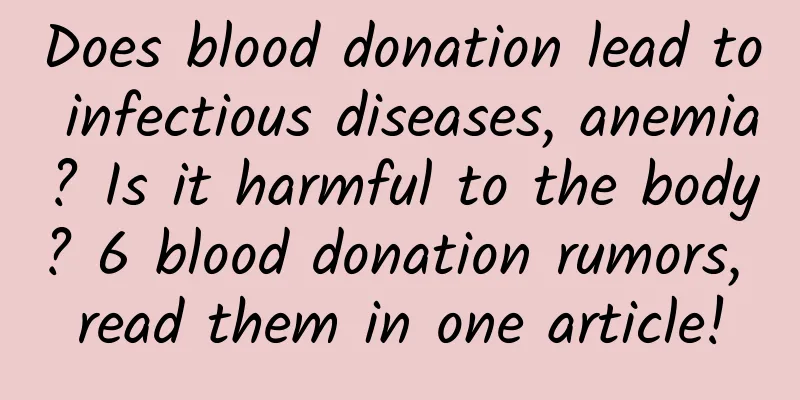Does blood donation lead to infectious diseases, anemia? Is it harmful to the body? 6 blood donation rumors, read them in one article!

|
Blood is a very important component of the life-sustaining system. Many people believe that donating blood for free is like "giving a rose to someone and leaving a lingering fragrance on your hands". However, some people think that donating blood may have some negative effects on the body and have some misunderstandings about blood donation. Today we will scientifically interpret these rumors for you and dispel your doubts. Rumor 1: Donating blood will reduce your immunity Wrong! The human immune system is a very complex system that includes multiple lines of defense against disease. From a physiological point of view, the main material basis of the human body's immune resistance is white blood cells. White blood cells, also known as leukocytes, are a very important type of blood cell in the human blood. They have many important tasks in the human body, including the ability to engulf foreign matter and produce antibodies, the ability to heal injuries and diseases, the ability to resist the invasion of pathogens, and the immune resistance to diseases. The number of white blood cells in a normal adult is between 8 billion and 20 billion. When donating 200 or 400 ml of blood, the donated white blood cells only account for 1-2% of the total white blood cells in the human body. The lost white blood cells can be replenished from the bone marrow within 1-2 hours. Therefore, the white blood cells lost from blood donation are negligible in the human immune system . In addition, the human bone marrow has a strong compensatory function . Under certain stimulation conditions, the bone marrow hematopoietic function can increase to 6-8 times the normal level. A healthy person produces about 200 billion red blood cells and 120 billion platelets every day. That is, the number of new blood cells produced by each healthy adult each year is equivalent to the total number of blood cells in the human body . Therefore, blood donation is also beneficial to the regeneration of white blood cells in the human body. After donating 200 ml of blood, the body will be replenished quickly and will not affect immunity. Rumor 2: Is blood donation harmful to the body? Will it lead to infectious diseases? wrong! The normal amount of blood in the human body is equivalent to 7%-8% of the body weight, and not all of this blood participates in the blood circulation. 20%-25% of the blood is stored in the blood vessels of organs such as the liver, spleen, lungs and skin . When the human body engages in strenuous activities or loses a small amount of blood, the stored blood in the body will be immediately released and participate in the blood circulation. In addition, under normal circumstances, the amount of blood donated each time only accounts for 5%-10% of the total blood volume. The body can completely rely on its own compensation and hematopoietic ability to replenish the circulating blood in the body in time to meet its own needs . Therefore, blood donation will not reduce the circulating blood volume, nor will it affect a person's health functions. Not only does it not affect human health, regular blood donation has many benefits for the body. Proper blood donation can effectively reduce blood viscosity and prevent a variety of diseases . After blood donation, due to the reduction in the number of blood cells, it can stimulate the bone marrow hematopoietic stem cells to produce more new blood cells and immunoglobulins , thereby improving the body's resistance. In addition, data show that regular and appropriate blood donation can speed up blood flow and increase blood flow to the brain, making people feel relaxed, clear-headed and energetic. When donating blood, the medical equipment used by the national blood collection and supply institutions are all disposable items that have been strictly sterilized and disinfected . Each blood donor uses a new set of blood bags and needles when donating blood. The process of voluntary blood donation is very safe and will not transmit diseases . The blood donated by the blood donor must undergo multiple testing procedures at the blood station and can only be provided to the clinic after it is fully qualified. At present, China's technical specifications for blood safety testing and clinical blood transfusion are constantly improving, and a relatively complete blood safety prevention and control system has been basically formed. Rumor 3: Donating blood is harmful to health, and doctors never donate blood wrong! Blood donation is an action in which citizens donate their own blood or a certain component of blood to a professional blood center for free storage, so that patients who need blood transfusion can save their lives. Taking whole blood as an example, the state requires that each person donates 200-400ml of blood each time, and the interval between each donation should be no less than 6 months . The view that donating blood in moderation does not harm health has been confirmed by millions of blood donors around the world. Blood donation is only a temporary reduction of the regenerative blood in the human body, which does not affect the normal regeneration function of the human blood. Therefore, as long as you donate blood at the prescribed intervals, it will not affect your health. Donating blood under appropriate conditions will not affect your body and will also have some benefits: blood donation stimulates the body's hematopoietic function to become more active , continuously produces new hematopoietic cells, and promotes metabolism; people who have participated in voluntary blood donation will have a voluntary blood donation certificate, with which they can get priority blood use rights when they or their family members encounter an accident and need emergency blood transfusion. It is not true that doctors never donate blood. Doctors have always been the main force of blood donation. Most hospitals hold blood donation activities regularly, and most doctors are willing to donate blood because they know that in some emergency situations, blood can save lives! Donating blood is a public welfare activity. Life is priceless. Donating blood is not only giving others a chance to live, but also giving yourself a chance to live! Rumor 4: Elderly people can lower their blood lipids by donating blood regularly wrong! I often hear many elderly people say that donating blood regularly can eliminate waste from the body and lower blood lipids! Some people even think that regular bloodletting can lower blood lipids. So can blood donation or bloodletting really lower blood lipids? Let's take a simple example. There is a bucket of salt water at home with a concentration of 10%. If we drain part of the salt water, do you think the concentration of the salt water will decrease? Of course not, the concentration is still 10%. When we donate blood, it is equivalent to drawing out part of the blood , but the concentration of blood lipids in the body will not decrease due to the reduction in the total amount of blood . Therefore, we cannot lower blood lipids by donating blood ! Myth 5: Donating blood can cause anemia wrong! Some people may experience some anemia-like symptoms after donating blood, such as dizziness, fatigue, pale complexion , etc. They think that blood donation can cause anemia, but is this true? In fact, everyone who participates in voluntary blood donation will be strictly screened in accordance with the national "Health Examination Requirements for Blood Donors", and only those who pass the health screening can collect blood. Therefore, the health screening process before blood donation can also help the public determine whether they suffer from anemia and other diseases . Secondly, according to national regulations, each blood donation shall not exceed 400 ml, which only accounts for about 10% of the total blood volume of an adult. Human blood has a strong regenerative function, and the hematopoietic system will recover and replenish quickly. Therefore, according to national regulations, donating blood will not only not cause anemia symptoms, but on the contrary, it can stimulate the body's hematopoietic organs and is beneficial to the regeneration of human blood cells. Therefore, participating in voluntary blood donation will not only prevent anemia but also be beneficial to health! Rumor 6: Immediate family members can donate blood to each other In movies and TV shows, people often see scenes like this: someone is in a car accident and needs a blood transfusion urgently, and the hospital happens to have run out of blood of this blood type, so the patient's family will ask the doctor to use their blood for emergency treatment. After seeing so many scenes like this, the audience has the wrong idea that blood transfusions can be performed between immediate family members. In fact, blood transfusions between immediate family members will produce a disease called graft-versus-host disease, so it is not recommended . So can't direct relatives donate blood to save each other under any circumstances? With the development of science and technology, there is a technology that can kill active immune cells so that they can no longer produce immune blood activity after being transfused into the body. This technology is irradiation technology. However, although blood transfusions between immediate family members in this way can avoid graft-versus-host disease, direct blood transfusions between immediate family members are still not recommended . In addition, if the freshly collected blood has not been tested for pathogens, it cannot be directly used for patients because it is not safe. Therefore, some blood donation scenes in TV dramas are not realistic . Everyone should master the basic knowledge of blood transfusion and not be misled by some clips in TV dramas. What should you pay attention to before donating blood? To ensure the quality of blood and reduce unnecessary reactions of blood donors during the blood donation process, blood donors should not eat too much the night before blood donation and should eat some light food to prevent blood turbidity and affect blood quality; if you have a cold, fever, cough, etc. two days before blood donation, you should postpone blood donation; you should maintain a good sleep the night before blood donation and do not go on an empty stomach; you can also read some blood donation promotional materials to learn related knowledge. What should we pay attention to during blood donation? Donors need to be in a good mood when donating blood. They should remain calm during the donation to reduce unnecessary irritability. If they feel anxious, short of breath, sweating, thirsty, or unable to sit still, they should tell the blood collection nurse immediately. During the entire blood collection process, the arms should not be moved at will. What should I pay attention to after donating blood? After donating blood, be careful to protect the needle hole to avoid infection. Pay attention to rest and don't stay up late. Within 1 to 2 days after donating blood, increase your water intake appropriately and add some high-protein and easily digestible foods. Avoid overeating. Do not donate blood again in the short term. When donating blood, as the number of red blood cells decreases, some organs of the body will not get enough oxygen. Some people will experience slight dizziness after donating blood, but these reactions will quickly disappear after proper nutritional supplementation. |
>>: How much did the operators pay for the iPhone? – Data interpretation
Recommend
What is the reason for the dull pain in the lower abdomen when the menstruation is delayed for three days?
Delayed menstruation and lower abdominal pain are...
My period was 8 days late
Is it normal for menstruation to be delayed by 8 ...
The correct way to use eye cream
We know that the skin around the eyes is relative...
I have pelvic inflammatory disease and my stomach is bloated.
Pelvic inflammatory disease is a relatively commo...
Precautions during early pregnancy
The early stages of pregnancy are more dangerous ...
What to eat during menstruation
Menstruation is the bleeding phenomenon caused by...
What foods can help maintain ovaries?
Clinically, many women are unable to conceive due...
What are the benefits of eating wax apples for pregnant women?
Women must pay attention to their nutrient intake...
What will happen to your body if you drink a cup of honey water every day? Can it improve your skin and relieve constipation? Don't drink it carelessly!
The "magic" of honey has been circulati...
What should I pay attention to when doing non-invasive DNA
What should be paid attention to before doing min...
Be alert to the attack of breast cancer and take precautions in advance
Breast cancer is one of the most common malignant...
What foods should not be eaten when having pelvic effusion?
For women, gynecological diseases do not only exi...
The correct way to take Mafulong to regulate menstruation
Marvelon is a hormone that can be used for contra...
What causes chest pain in women?
I believe that every girl will encounter breast p...
Why does the left side of the abdomen hurt during pregnancy?
Nowadays, more and more new parents are getting p...









